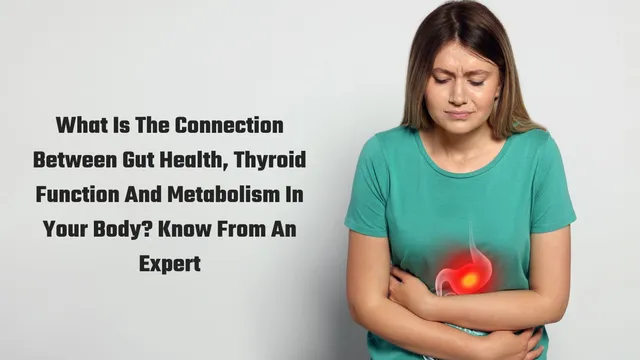- By Priyanka Munshi
- Sat, 12 Apr 2025 04:11 PM (IST)
- Source:JND
Metabolism is often thought of as a simple equation of calories in and calories out, but at its core, it’s an intricate network of hormonal, digestive, and immune functions working in sync. Two conditions that often disrupt this balance yet are rarely discussed together are Irritable Bowel Syndrome (IBS) and hypothyroidism. While they may appear unrelated at first glance, emerging research reveals a deeply interconnected relationship between the gut and thyroid, one that has profound implications for how we understand, diagnose, and treat metabolic disorders. In a conversation with Jagran English, Dr. Aravind Badiger, Technical Director at BDR Pharmaceuticals, discussed the connection between gut health, thyroid function, and metabolism in the body.
IBS is a functional gastrointestinal condition marked by abdominal discomfort, bloating, and altered bowel habits either diarrhea, constipation, or both. Hypothyroidism, in contrast, is a condition in which the thyroid gland underproduces hormones essential for regulating the body’s metabolism, leading to fatigue, weight gain, cold intolerance, and frequently, digestive issues. These seemingly separate conditions often overlap in patients, and the underlying reasons are as physiological as they are biochemical.
One of the key connections lies in the gut’s role in converting thyroid hormones. Approximately 20% of the inactive hormone T4 is converted into its active form, T3, in the gut with the help of a balanced microbiome. When this microbiome is disrupted, as is common in IBS, the conversion process falters, amplifying the symptoms of hypothyroidism. Conversely, hypothyroidism slows gut motility, often resulting in constipation and a gut environment conducive to bacterial overgrowth. This not only mimics IBS symptoms but can also worsen them, leading to a frustrating cycle of bloating, discomfort, and poor nutrient absorption.
The immune system also plays a central role in this connection. Many people with hypothyroidism, particularly autoimmune types like Hashimoto’s thyroiditis, also experience gut-related inflammation and permeability issues, often described as “leaky gut.” When the intestinal lining becomes compromised, it allows antigens and toxins to pass into the bloodstream, which can provoke an immune response that targets the thyroid and other tissues, added by Dr. Aravind.
From a metabolic standpoint, the dual burden of IBS and hypothyroidism can significantly disrupt energy balance. The slowed digestion, inflammation, and poor absorption seen in IBS can lead to deficiencies in key nutrients such as iron, vitamin B12, and selenium all of which are vital for thyroid function. Add to this the hormonal sluggishness of hypothyroidism, and it becomes clear why patients often experience persistent fatigue, weight changes, and mood disturbances. This chronic physiological stress can create a downward spiral, where the body’s ability to self-regulate becomes increasingly compromised.
Furthermore, Dr. Aravind Badiger said, The pharmaceutical industry is beginning to respond to this complex picture with more holistic treatment options. While levothyroxine remains the standard for thyroid hormone replacement, there is growing interest in combination therapies that include both T4 and T3, particularly for patients with absorption issues due to gut dysfunction. On the gastroenterology side, targeted antibiotics like rifaximin, low-FODMAP diets, and carefully selected probiotics are increasingly part of treatment plans for IBS and related conditions like SIBO (small intestinal bacterial overgrowth). Moreover, the concept of treating the gut as a foundational pillar in endocrine and metabolic health is gaining traction in clinical research and pharmaceutical development.
This evolving understanding highlights the importance of cross-specialty collaboration in patient care. Gastroenterologists, endocrinologists, and primary care physicians must work together to identify overlapping symptoms and tailor treatment approaches that address the root cause rather than just the surface-level symptoms. As pharmaceutical strategies become more precise and patient-centered, we can expect to see more personalized interventions that recognize the gut-thyroid connection as a key factor in metabolic health.
At last, Dr. Aravind Badiger said, in essence, IBS and hypothyroidism are not isolated conditions but two sides of a larger story about how interconnected our bodily systems really are. The gut and thyroid function as partners in metabolism, and when one struggles, the other often does too. By approaching treatment with this understanding and with support from innovative pharmaceutical solutions—we can aim for more effective, lasting improvements in both gut health and hormonal balance.

